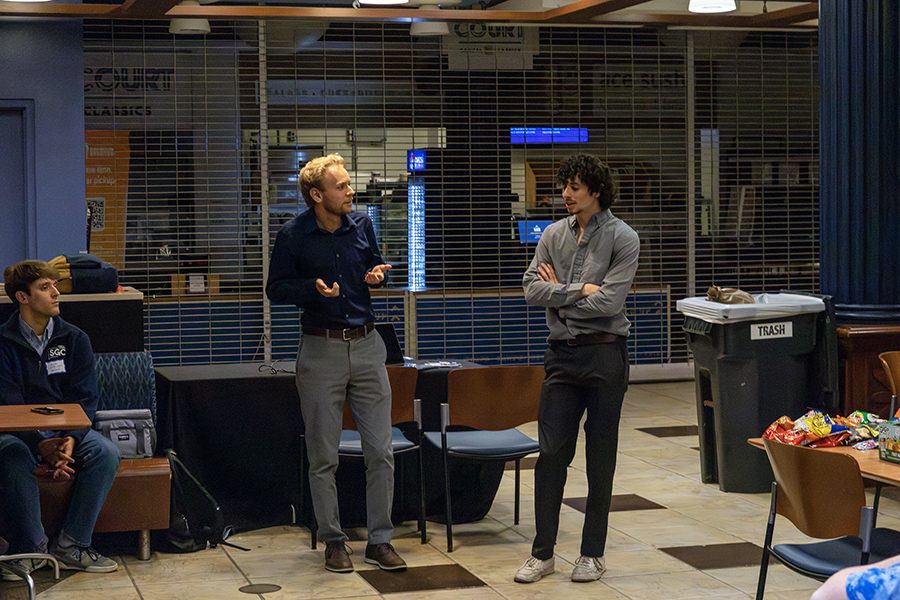Sam Edelstein was the web director for The Ithacan from 2019–22.
Jason Starkman ’22 and Sam Edelstein ’22 said that while studying at Ithaca College they noticed that for them and their peers, making sense of the complexities of politics was intimidating and time-consuming. Their observation called them to action and in 2023, the pair joined a tech startup with a vision to create an accessible civic education app. On Sept. 4, Starkman and Edelstein, chief technical officer and chief operating officer, helped launch Poliquicks.
Once downloaded from the app store, Poliquicks users are met with an onboarding questionnaire. They are asked to gauge their extent of political knowledge, place themselves on the U.S. ideological spectrum and choose which issues are most important to them. Starkman said the responses are used to personalize the educational content on each user’s app.
Included in the Nov. 2 update to the app, the “Today’s Feed” tab includes polls, issue-related content quizzes, Supreme Court cases, and Congressional bill action that is personalized according to each user’s interests. Starkman said his and Edelstein’s goal is to make the feed tab even more personalized by incorporating hyperlocal data.
“What we’ve done so far is we’ve made this really generalized app that no matter where you are, [it] can show you your representatives and you can track federal action every day,” Starkman said. “But it could still be improved in that if we’re working with [political] offices directly, they can give us very specific information to your area [and] your local candidates.”
While the Poliquicks team is working to fill in gaps about state and local candidates and bill action, users are able to learn about their state representatives in Congress and Congressional candidates that will appear on their ballot when they vote in the general election. The app’s “Poli-Match Quiz” also recommends users who to vote for based on their stances on various political issues, which Edelstein said he hopes will enable users to make better-informed decisions at the polls.
“By using our matching quiz, we hope that users can get a better picture of who these candidates are without having to go through all the confusion surrounding politics,” Edelstein said.
Starkman said their goal ahead of the 2024 election was to help bridge the hyper-partisan gap within the U.S.
“People are generally more aligned than they think,” Starkman said. “Often you’re pushed to one side or the other, and everything in between gets muddled. We’re hoping that [Poliquicks] can create a way around that where hopefully you’re voting for people and not just your party.”
Starkman’s sentiment could explain why, in the general election, Vice President Kamala Harris underperformed in the presidential race compared to Democratic senate candidates. In many key Senate races, like the ones in Nebraska, Texas and Ohio, Democratic candidates received a larger vote share than Harris did in those states. Although for many of these races Democrats did not receive enough votes to defeat their GOP competitors, this trend suggests a large share of voters split their tickets to vote for individual candidates rather than purely for their own party, according to analysis from News outlets like Vox and USA Today.
Poliquicks’ structure is reminiscent of popular social media sites. Similar to Instagram, users navigate through five tabs at the bottom of the app’s interface, with the “feed” and “search” tabs located in the same positions on both apps. Starkman and Edelstein said this was intentional.
A Pew Research poll published in September found that 54% of U.S. adults get at least some of their political news from social media sites, a trend that has increased since 2020. Edelstein said the pair wanted Poliquicks to be a better alternative.
To prioritize unbiased information about representatives, Starkman said Poliquicks features a direct verification process. Artificial Intelligence is used to collect candidate information from public sources like Congress.gov and FEC.gov, and private data-collection institutions that partner with Poliquicks like the U.S. Vote Foundation and the Center for Tech and Civic Life. Then, Starkman said the profiles are sent to their respective politicians, who then have the opportunity to verify or add to the information.
At a Student Leadership Initiative event held at the college on Nov. 4, Starkman and Edelstein spoke to a group of six students about the development of Poliquicks and their goals while creating the app. Sophomore Andrew Huntsberger attended the SLI event and said that finding nonpartisan news sources is becoming increasingly difficult in the polarized U.S. political sphere.
“CNN has gotten even further left and Fox News has gotten further right … and there’s no middle ground,” Huntsberger said. “I think it’s especially evident in the last two presidential terms, how [much] further apart polarization has gotten.”
Huntsberger said he tries to avoid getting political information from social media sites because of its partisan nature. He said Poliquicks could be a viable alternative to such platforms, but that he thinks the company needs time to grow.
“I think it’s a really interesting proposition, and I think that if they market it the right way, it could be widely used and really helpful,” Huntsberger said. “I think it’s a matter of actually getting to that point, because [Poliquicks] seems to be a pretty small company right now.”
Starkman said about 15 people make up the Poliquicks team now, both on the software development side and the business and marketing side. When the project started, the team comprised Starkman, Edelstein and Vienna Mott, an engineering business manager for the semiconductor manufacturing company Advanced Micro Devices who founded the tech startup that became Poliquicks.
Usership has also increased since Poliquicks launched. Starkman said about 300 people use the app, with the largest user bases located in New York, California and Texas. Users ages 25–49 make up 40% of the user base, ages 18–24 make up 33%, ages 13–17 make up 17% and ages 50+ make up 10%.
Starkman said the team plans to engage in outreach that targets teenagers. He said the business side of the team has plans to partner with high schools to train teachers on how to incorporate Poliquicks into the classroom.
“You don’t always know what the source of that information [on social media] is and if it’s being spun in any biased way,” Edelstein said. “We thought there needs to be a big focus on keeping [Poliquicks] unbiased and nonpartisan.”









